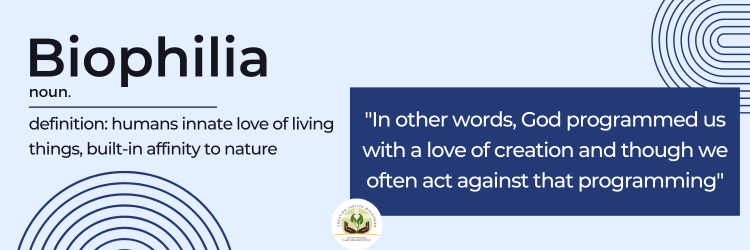|
by Derrick Weston Last year, I stumbled upon a new word, “biophilia”. Biophilia is defined as humans’ innate love of living things, a built-in affinity to nature. The Biophilia hypothesis, put forward by Harvard entomologist Edward O. Wilson, states a belief that humans evolved as creatures deeply enmeshed with the intricacies of nature and that this affinity remains ingrained in our DNA. In other words, God programmed us with a love of creation and though we often act against that programming, it’s clear that the healthiest versions of ourselves are often found outdoors. What I find most fascinating about the biophilia hypothesis is that it is not limited to any one race or culture. All humans have this innate love of the natural word. Furthermore, we all suffer when we are separated from creation. In his book “Lost Connections: Uncovering the Real Causes of Depression and the Unexpected Solutions” , Johann Hari lists disconnection with nature as one of the elements of the Western world that has led to increasing levels of depression and anxiety. I think we all know this on some level, probably on the same cellular level where our biophilia resides. What gets lost in this conversation at times is the role that race plays in our ability to access nature and therefore enjoy it. Dr. Carolyn Finney wrote a book provocatively titled “Black Faces, White Space: Reimagining the Relationship of African Americans to the Great Outdoors”. In this dense doctoral work, Dr. Finney argues that people of color, and specifically Black people, have the same love of the outdoors that white people have but outdoor spaces have become racialized largely through a history of them being unsafe for Black people. The stereotypes of Black people not camping, swimming, hiking, etc… so often come from legacies of Black people not being permitted in natural spaces or of those spaces being unsafe for us. Dr. Finney argues that people of color, and specifically Black people, have the same love of the outdoors that white people have but outdoor spaces have become racialized largely through a history of them being unsafe for Black people. The stereotypes of Black people not camping, swimming, hiking, etc… so often come from legacies of Black people not being permitted in natural spaces or of those spaces being unsafe for us. Dr. Finney concludes that while ecological organizations are almost exclusively staffed by white people at the executive levels, Black people have deep concerns about the state of creation that often go unheard or are eclipsed by other issues that are more deeply associated with racial justice.
If in fact all of God’s people are made with in an innate desire to both be in and care for nature, then it is important that all of God’s people, regardless of race, have safe access to the beauties of the natural world. It is also important that people of color have a seat at the table as ecological issues are discussed and as plans for creation’s care are made. This is especially true as we see climate change having disproportionate impacts on communities of color around the world. For it to truly reflect the values of God’s Reign, creation justice space cannot be exclusively white space. That means that those of us people of color who care about these issues must speak up more frequently and that those who are most often in control of the conversation need to make more space for our voices to be heard.
0 Comments
Your comment will be posted after it is approved.
Leave a Reply. |
About this BlogThis blog shares the activities of Creation Justice Ministries. We educate and equip Christians to protect, restore, and rightly share God's creation. Archives
July 2024
Categories
All
|
Photo from johndillon77

 RSS Feed
RSS Feed